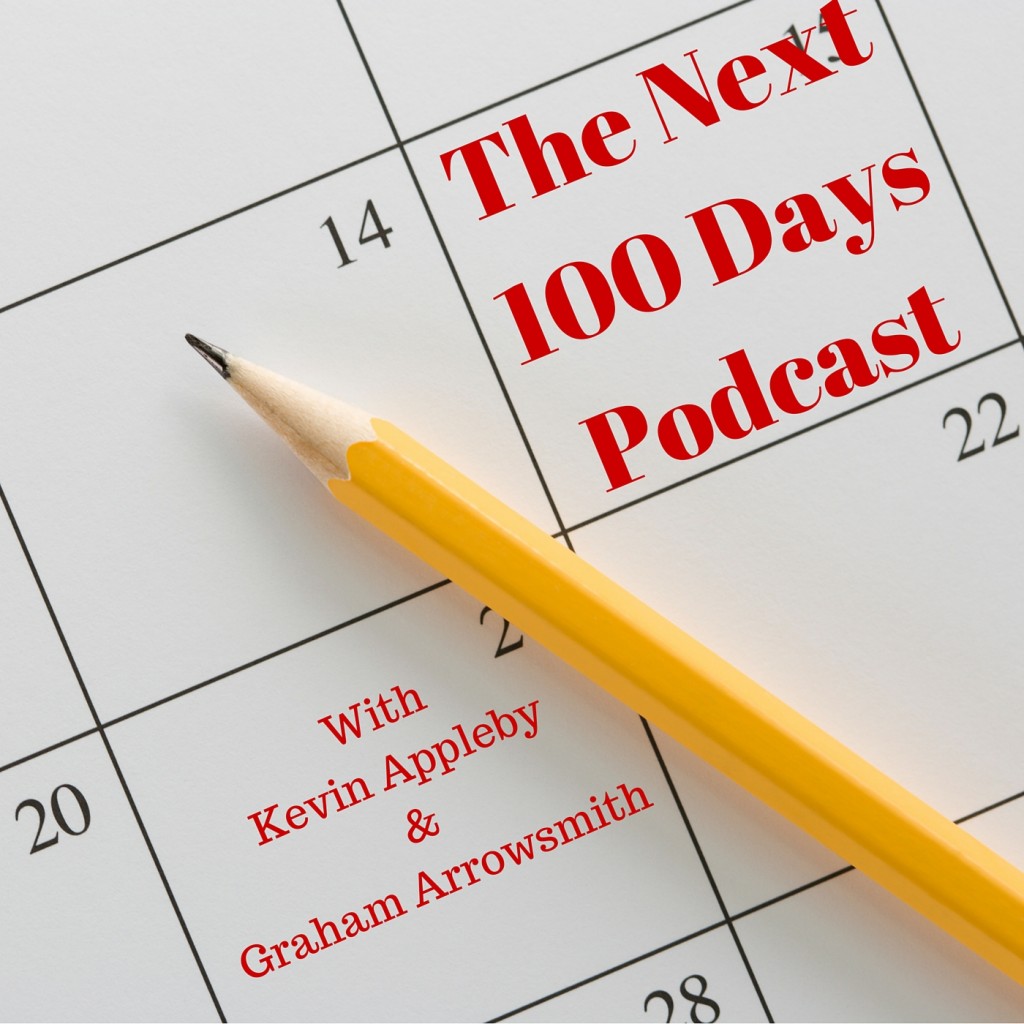Sales Training with Nick Bramley
Sales training is provided to listeners by Nick Bramley on The Next 100 Days Podcast. Nick is founder of Impactus Group and helps organisations around the world to improve their sales performance.

Nick has been involved in sales and sales training for his entire career. He’s competitive by nature. Nick has developed teams. His philosophy is to keep it simple, communicate well and get people on board with clear messages.
Due to his philosophy, to be a good fit for Nick’s business you need to be growth oriented and have ambition. Similarly, you have to want to make a difference and not be a plodder (by definition, if you are reading this and listening to the podcast, you cannot be a plodder, but just in case!!).
Sales Strategy
The first piece of sales training that Nick provides is anchored around this diagram:

Nick gets asked to close business. But Nick finds that the problem is not always closing for example. Nick looks at sales in the whole. Start with the strategy.
- Who am I targeting
- Why have I chosen that sector
- How am I going to get at them
- Where are they based
- When is the best time to target them?
As a result of all these questions you can get your strategy right. Cover all the steps, not just closing or the first step.
Have you forgotten where YOUR sweet spot is?
Another important aspect of sales is understanding where your sales sweet spot is. For this, start with: who, what, why, where, when, how. Look at the next 100 days!
Nick says the reason people struggle with sales is where they are trying to complicate it.
- compelling product
- interesting price
- capable of generating interest
- getting sales over the line
Key Messages
Here’s how to remember the WHO WHAT WHERE WHY WHEN HOW – especially if you like rugby.

Five naked bottoms on a rugby post.
FAB
It’s very basic. But take this test:
Give me 5 reasons why I should buy from your business.
It NEVER fails to bring out features. If you tried it, how many features do you have?

Features
- a feature is something ABOUT your business. Such as, how long you’ve been established, where you are based, how many staff you’ve got, the product range that you provide, great customer service, we are excellent at what we do, we’re technically capable, experienced, capable. Not only are they givens but they are pedestrian. Nobody BUYS features.
Advantages and Benefits
- advantage or benefit – what is the advantage to the client? People are buying probably 5 or 6 advantages or benefits:
- improve performance
- reduce risk
- financial incentive – more revenue or reducing cost
- operational advantage – shortening your process
- compliance – nobody buys this on its own, an advantage but secondary
- personal – busy people need to have their work and lives made easier
If you start with “I’m ringing to help performance in a particular part of your business”, that is better than talking about one of your features.
Enquiry Handling
Do not treat every email or phone call as the same. Have a scoring method to establish which are most realistic. Kick out the tyre kickers. People without intent.
NEED – driven by requirement. Your tyre has shredded – you have to, you need a tyre.
WANT – you’re making an analysis of tyres. Your tyres need changing in a couple of months. Timescale and options come into the decision making. Sales people often fail to connect with these people, because they don’t have the patience to wait 3 months. Really good sales professionals know they have a good pipeline from the conversations they have had.
DESIRE – wouldn’t it be great to buy this or that. No budget. They get excited, so it makes the sales person get distracted.
Seems like the free-product give away is a good example of desire/no budget. They want something for free, but they have nothing to spend.
Not a cold call, it is a first call.
Cold calling died with the advent of the internet. So much data on sites, LinkedIn. The old fashioned method was calling a directory, name and telephone number. Do less calls with more information.
Why Your Outbound Calls Are Failing
Nick explains the importance of the first 15 seconds of your outbound call, in this short video.
Hence, NEVER SAY – to someone you have never met on the phone – “How are you?”
Who are you to ask me that? It is disingenuous to ask.
Instead, take this approach:
MY NAME IS: Good morning, it’s Nick Bramley
CALLING FROM: I’m calling from Impactus
THE REASON FOR MY CALL IS: The reason for my call is
CREDENTIALS or CREDIBILITY: We’ve had a particularly successful campaign for a client generating £x in sales and I’m looking explore how we can get you interested in the …
Then PAUSE
Learn to love the silence.
Allow them to respond.
The Secret to Getting Through a Gatekeeper
First of all, acknowledge that the gatekeeper has all the power. Because they know what is happening in their world. You don’t know whether the person’s jacket is on the back of the chair. Are they in or not?
Most sales people treat first responding staff poorly – PA, receptionists, colleagues etc. But that is a mistake.
When people call they inevitably say
Could I speak to Nick Bramley, please?
The minute you say that, you are giving them permission to decide whether you are allowed to be put through.
60% of people who would normally challenge you, will reluctantly through. A lot better strike rate than asking permission.
If they then say to you “What’s it in connection with?”
Be professional and don’t lie. Don’t say it’s a personal matter because it’s not. Instead, be vague.
To the person you are put through – I want to help you with your XYZ, here’s what we have to offer, how interested would you be in that?.
The Art of Signposting
This is about keeping control of the sales meeting. You may be on their premises. But, you still need to control that meeting. If they ask you to state why your are here and a little about your company. SO instead use signposting.
SMALL TALK – thanks for seeing me, lovely weather,
THEM – what I’m here to achieve to day is, to understand a little bit about your business, the pressure points that you’ve got, in areas where we might be able to help you.
YOU – I’ll then tell you where we might be able to find some common ground, tell you a bit about us, work we’ve done and how it might be relevant,
COMMON GROUND – once I’ve done that if we can find out where we may have some complementary opportunities to work together, deal with any questions
AGREEMENT – and if there are any next steps we’ll deal with those then, how does that sound?
Answer: Great
Then finish with TIMING – “How long have we got?”
If you say this at the start of your next prospect meeting, you’ll be able to keep in control.
S.C.O.T.S.M.A.N.
Another sales training technique that you may find useful is the Acronym Scotsman.
How do you score a sales conversation? An enquiry by email. An inbound phone call. A face to face meeting. A conversation at a networking event. A follow up telephone call.
ARE YOU SCORING BASED ON GUT INSTINCT.
- Solution – you get a point for this. if you cannot do this you are in the wrong room. Stop now and find the right rooms.
- Competition – have you established whether they are talking to anyone else including an incumbent or them doing it themselves. If they are, there is NO point for competition.
- Only Me – should be unique. Have you got something that only you are offering. Different in the marketplace? You wouldn’t ordinarily get a point for this, unless you are unique.
- Timescale – will they make a positive decision to buy during what’s left of the current month and the following month. Today, it’s 8th October, so rest of October and all of November. The world changes quickly.
- Size – are you the right size for the project? If size is a problem, no point.
- Money – have they got a budget 2 points
- Authority – are you talking to the person who signs the cheque? 2 points.
- Need – what are the consequences of doing or not doing what you are proposing? If they can get by without the project, it is not a need.
Closing
Selling is like dating. It’s like asking for a second date. The principles are the same.
Before asking for the business:
Remind them of you being a good fit.
Then, ask for the order. Don’t be a choker. On a date, neither of you say anything, you just walk away.
Direct – hake hands, look in eye and ask for the order.
A softer closer is:
Summarise the good fit (you hit their sweet spot), then say,
- Where do we go from here?
- What do we go next?
Then hold the person to account – if the person says he’ll go away and talk to board meeting…
Don’t leave it hanging – when will that be? what help can I give you? Let’s talk on X to discuss this.
Contact Nick Bramley
Website: http://www.impactus-group.com
LinkedIn: https://www.linkedin.com/in/nickbramley/
Side Bet with Nick Bramley, the Middlesbrough fan. Leeds United to finish above Middlesbrough £1 to the winner.




